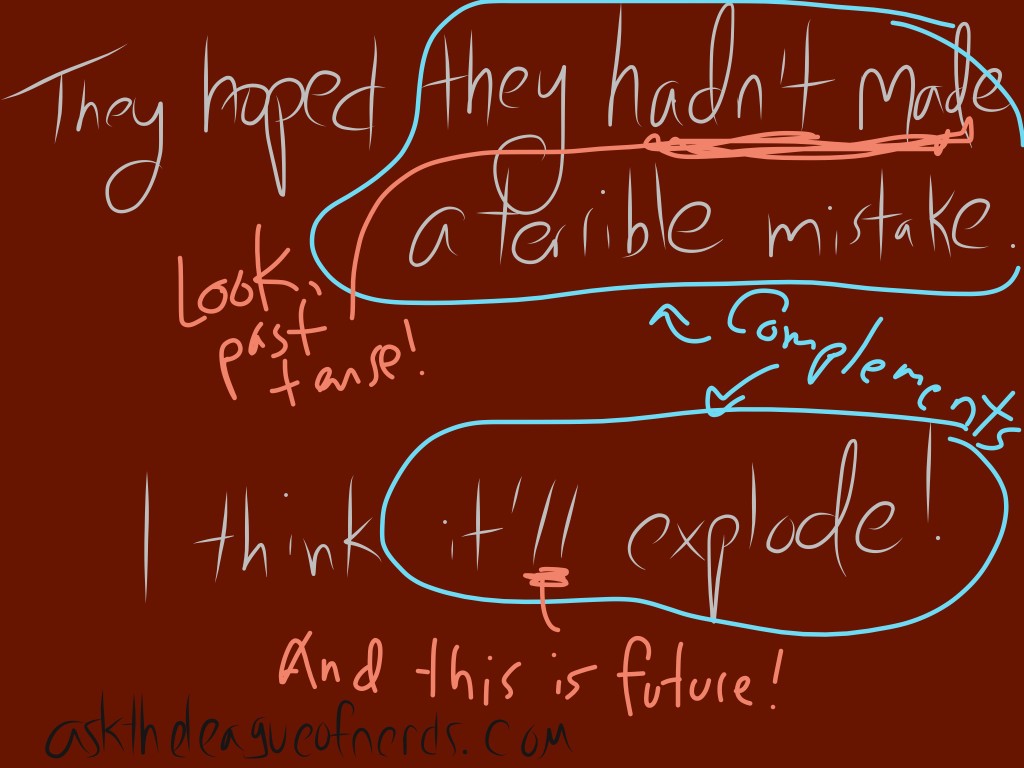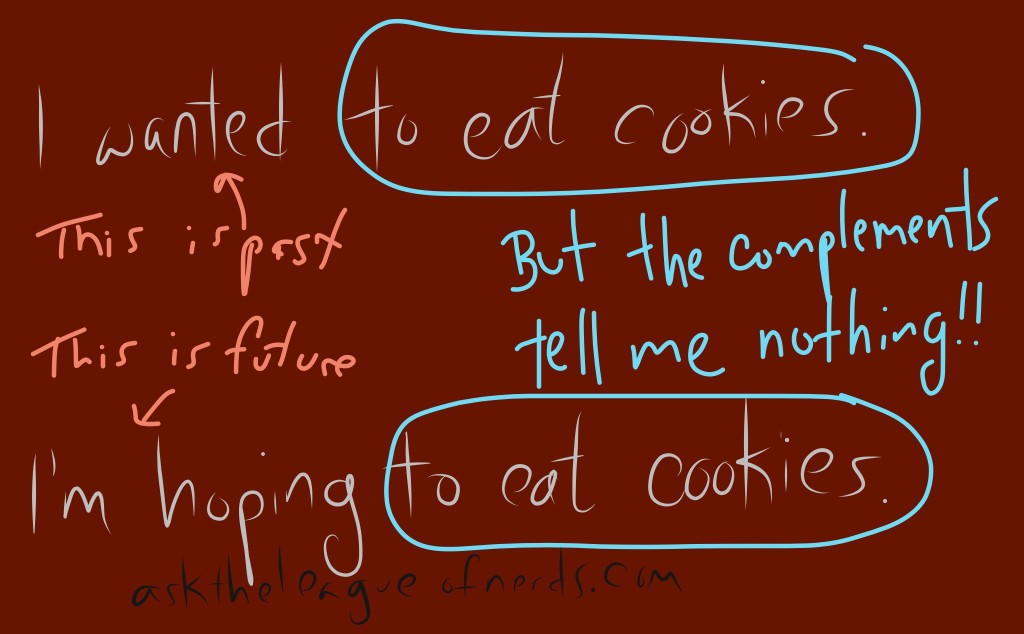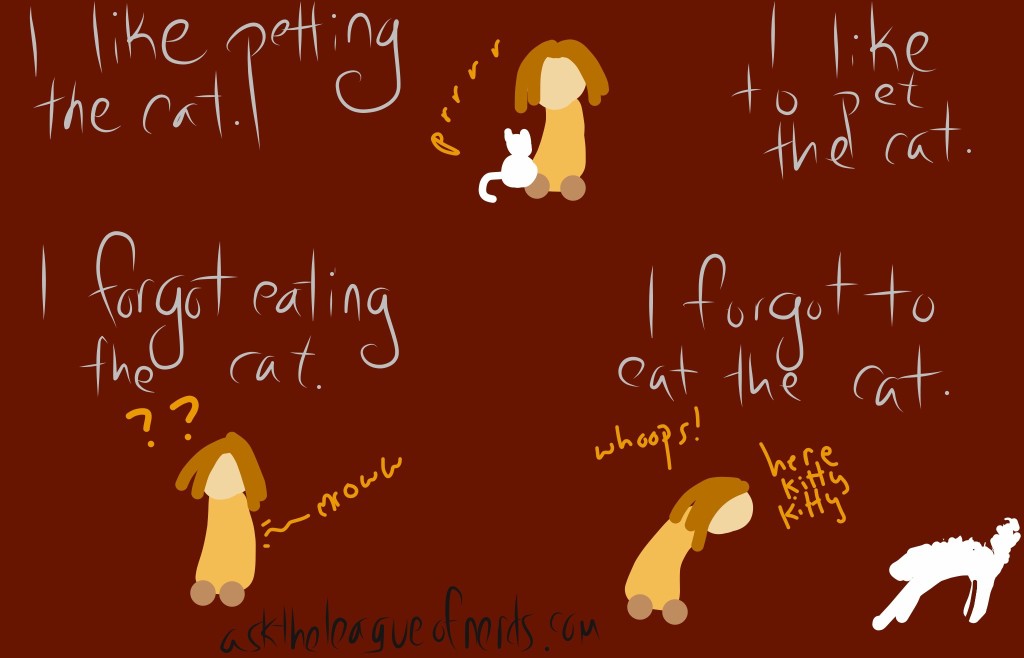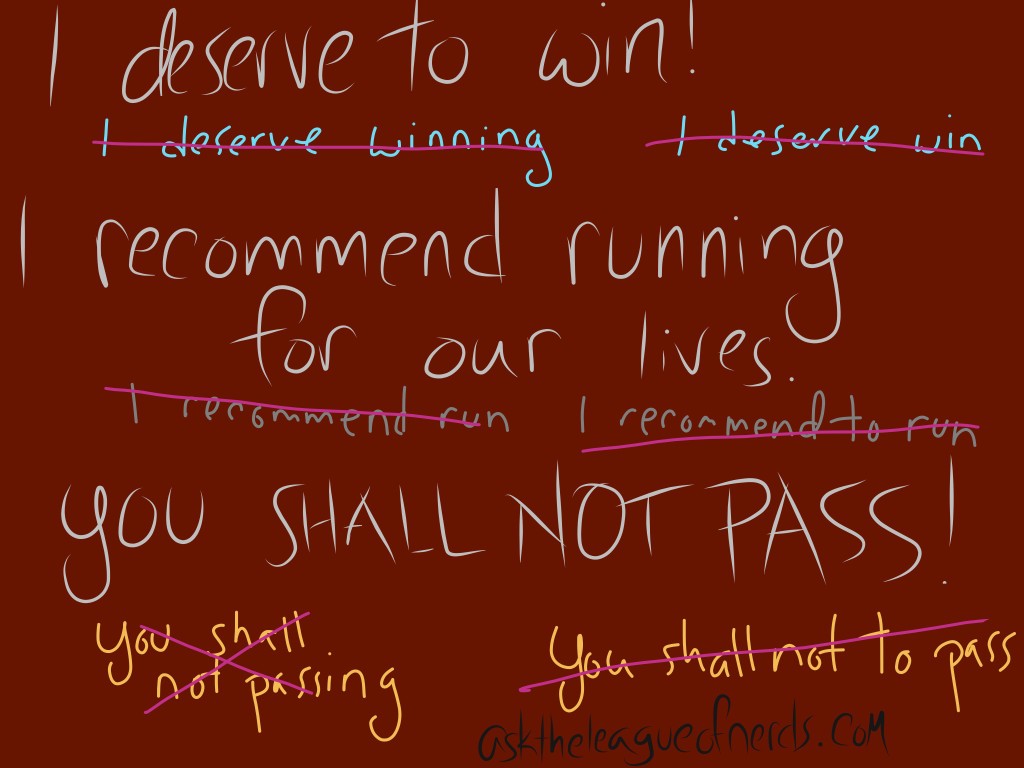Hey, Language Nerd. I’m editing something and I need some help. How would I explain why we don’t say things like “going to eating” without leaving room for other mistakes like “let me to paint”?
-Rhone
***
Dear Rhone,
It’s tough.
First we need to get into our complements. A finite complement specifies a time:

Drama! Action! Grammar!
But a non-finite complement doesn’t have a particular time attached. That’s why it’s, uh, not finite.

Mmm, cookies.
“It’ll explode” indicates a time, “to eat cookies” does not. Finite clauses have their own exciting quirks and misadventures, but here and now, we’re looking the timeless, non-finite complements.
There are three main choices of non-finite complement*: the gerund-participle or “-ing” form (running, singing, laughing); the bare infinitive, which is the dictionary form (run, sing, laugh); and the full infinitive or “to” infinitive (to run, to sing, to laugh).
So far so straightforward. Now for the tricky bit – sticking them in sentences. Some verbs only allow one type of complement.
And some verbs allow more than one option, sometimes with a difference in meaning and sometimes not.

Also “remembered,” “tried.”
But there isn’t an easy, hard-and-fast rule about what verbs get what complements when. There are guidelines, but they’re full of fuzziness and exceptions. And this is an area still being heavily researched, without general consensus. Two different grammarians, looking at their massive archives of non-finite complement data,** could (and have) come up with different theories for why “mimic” gets an “-ing” form and “must” needs a bare infinitive.
Here’s a quick sampling of what we can see: gerund-participles can follow prepositions and infinitives can’t; sensory verbs (hear, see) take a bare infinitive; commitment verbs (agree, order) take a full infinitive; modals (must, can) take a bare infinitive; some causatives take bare infinitives (make, your original let) and some take clothed (allow, cause).
There are many more lumpy rules like this, but no blanket principle. With so many disparate little groups it’s hard to see how they’re organized, much less state a rule in some sort of memorable jingle or whatever. And when there’s no North Star guidance to go by, ESL teachers and other would-be explainers generally have two methods to fall back on: The List, or The They’ll Figure It Out.
The List method involves categorizing a couple dozen (or hundred) verbs into columns of Takes a Gerund-Participle, Takes a Bare Infinitive, Takes One to Know One, etc., slapping it on a chart, and telling students “Here, memorize. Quiz next Thursday.”*** This would be Old School. More modern is the They’ll Figure It Out approach: don’t explain anything, but expose the student to lots and lots of natural language, and let them build up the rules subconsciously, over time, like a native English-speaking baby would. This works better, but it sure takes a while.
Or you can compromise: mention that verbs can be followed by other verbs in a couple different patterns, practice with one or two verbs that are clear, common, consistent examples of each category, and then let the learner stick new verbs into the correct slot(s) as they crop up naturally. If you’re editing work by somebody who already has fair English, but is having trouble with this in particular, I’d go with that.
All clear? Good. Then it’s time for a sequel hook.
You asked about “let me to paint” and “going to eating.” “Let” is taking a full infinitive complement, but is that really what’s happening with “going”? Or is there a different, better analysis?
Find out in…. THE FUTURE, SOMETIME.
Yours,
The Language Nerd
*Pullum includes the participle form, e.g. “eaten,” as a non-finite complement. Sounds fair to me, but that’d just be borrowing trouble where this post’s concerned.
**Because remember, quality grammarians do a hell of a lot of work to understand how language is actually used by its speakers, rather than pulling rules from their posteriors and then being snarky about it.
***My description may be slightly biased by the painful flashbacks I’m currently having to high school German class.
Got a language question? Ask the Language Nerd! asktheleagueofnerds@gmail.com
Twitter @AskTheLeague / facebook.com/asktheleagueofnerds
So Patrick Duffley is legit, y’all. He dismantles some of the ideas for overarching NFC-organization principles people have come up with in this paper (as subjects, not complements, but still). Unfortunately most of his work (including his own ideas for what the rules are) is behind massive paywalls. This is killing me, because he wrote a freaking book called The English Gerund-Participle: A Comparison with the Infinitive, also known as EXACTLY WHAT I’M LOOKING FOR DAMMIT. I’ve gotten drawn into this topic, but I’m gonna hold off on writing more until I can get my hands on a copy of that thing.
P.S. Google books why do you taunt me with the first chapter, why why.
Other refs: Pullum is on point, natch, and just this once I remembered to temper my more theoretical leanings with practical whatnot, thanks to George Yule’s Explaining English Grammar.
